|
|
|
Sort Order |
|
|
|
Items / Page
|
|
|
|
|
|
|
| Srl | Item |
| 1 |
ID:
080712
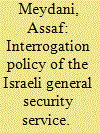

|
|
|
| 2 |
ID:
109571
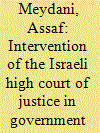

|
|
|
|
|
| Publication |
2011.
|
| Summary/Abstract |
The current study continues the empirical, quantitative line of research, which, in recent years, has become an important part of the literature pertaining to the relationship between law and politics in Israel. This literature discusses the relationship between the Supreme Court as the High Court of Justice (HCJ) and the political system of government and the Knesset, but lacks a quantitative analysis of this relationship mainly by the government. This study, based on 2,869 petitions filed by petitioners to the HCJ against the government and its members between 2000 and 2006, seeks to remedy this lack. We found that despite the increase in petitions against the government, the HCJ intervenes less in the government's work-only in 18% of cases did it intervene and hear the petitioners. According to the data, about 50% of the petitions were rejected by the HCJ, 21% were postponed, and 11% were retracted, either by the state or by the petitioner. This study is mainly descriptive and does not pretend to deeply analyze the reasons for the findings. Such analyses may be found in an institutional-process analysis of the relationship between the HCJ and the Israeli government as a means for resolving the empirical findings.
|
|
|
|
|
|
|
|
|
|
|
|
|
|
|
|
| 3 |
ID:
083691
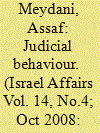

|
|
|
| 4 |
ID:
149185
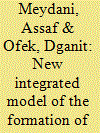

|
|
|
|
|
| Summary/Abstract |
This article integrates various aspects of the office-seeking approach, the policy-seeking approach and the institutional rule approach to theories about establishing coalitions to create a new model that takes into account the mutual influence between the formation and stability of the coalition, party policies and the difference between the status of the party that formed the coalition and that of its coalition partners. It also introduces a new index based on mechanical physics to measure the degree of fragmentation in the coalition. Using data from the 20 terms of the Israeli Knesset, particularly the Twentieth Knesset, as our case study, the article demonstrates that large ideological distances between the political parties can be an advantage for the coalition’s formateur. The results confirm the validity of the proposed model, which awaits further validation in other parliaments worldwide.
|
|
|
|
|
|
|
|
|
|
|
|
|
|
|
|
| 5 |
ID:
131854
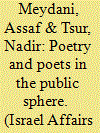

|
|
|
|
|
| Publication |
2014.
|
| Summary/Abstract |
Political poetry is not tested by its impact and the number of its readers but in its very participation in the public discourse on the issues of the day. Poetry moves between forces that focus the attention of its audience inwards, to the lyrics of the poems, and the forces that connect to the social, cultural, and political climate in which the poems are published. These movements reflect the power of poetry, which, using language, breaks the barriers that exist between people - individuals or groups, as well as between these individuals or groups and reality. This way, the poet serves as the element that formulates the informal cultural feelings in society and offers an interpretive package of the existing reality, as well as the alternative reality. Poets place their 'truth' within the perception of reality, and this truth can compete in the public arena with the 'truth' that is portrayed by politicians.
|
|
|
|
|
|
|
|
|
|
|
|
|
|
|
|
| 6 |
ID:
135779
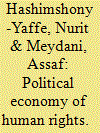

|
|
|
|
|
| Summary/Abstract |
This article analyses the attempts to establish a human rights commission in Israel by using public choice theory and socio-cultural variables as explanations. It develops a theoretical framework that views the decision-making process (1999–2004) as dictated by several conditions: non-governability, the judicialization of politics and the special characteristics of civil society in Israel. It emphasizes the existence of an outcome-directed, participative political culture with alternative (instrumental) characteristics. Thus, the call for social change is characterized by protest and challenges to the authorities. These considerations have received less emphasis in the human rights literature.
|
|
|
|
|
|
|
|
|
|
|
|
|
|
|
|
| 7 |
ID:
080322
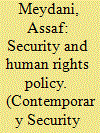

|
|
|
|
|
| Publication |
2007.
|
| Summary/Abstract |
When are interrogators exempt from criminal responsibility by the imperative to
acquire information that might save lives endangered by terrorist attack? This
article uses the Israeli example to show that aspects of security policy previously
assumed to be based on independent foundations actually results from political bargaining.
Interrogation of terrorist suspects is governed instead by bargaining
between political leaders, civil servants and interest groups, all of whom function
in an environment conditioned by non-governability, judicialization, and an alternative
political culture.
This article examines tensions between human rights and domestic security
through a detailed analysis of the dispute over interrogation methods by the Israeli
General Security Service (Shin Beth), which resulted in the Israeli High Court of Justice's
Interrogation Decision of 1999. While most studies deal with security culture as
a belief that determines polices, this article elaborates on the input of various political
actors who operate within a complex of variables. The article examines the alternative
culture in Israel that has a powerful effect on the creation of public security
policy. The gridlock created by competing governmental institutions has prompted
judicial intervention in many areas. Faced with a paralysed government, interest
groups have created an alternative political culture, stressing action through the
courts. Accelerated judicial activism has the effect of diminishing respect for the
law in the eyes of the public.
|
|
|
|
|
|
|
|
|
|
|
|
|
|
|
|
|
|
|
|
|